新概念英语第二册第七课
新概念英语第二册第7课完整

steal sth. steal sth. from sb. steal 偷钻石 steal the diamonds
vi. 偷偷地行动,悄悄靠近
guard n.警戒,守卫 keep guard body guard life guard guard v. 保卫
站岗
保镖
救生员
precious, valuable, invaluable, valueless priceless, worthless 毫无价值的
有价值的
珍贵的
无价之宝
parcel n. 包裹 a parcel of books The post office lost my parcel. it's awfully annoying.
A place for passengers
ቤተ መጻሕፍቲ ባይዱ
A place for planes
A place for luggage
expect
expect ① vt.&vi. 预计,预料 Jim has passed mathematics as his teacher expected. I didn't expect to find you here. I expect a storm. ② vt. 等待,期待,盼望(心理上的等待) They are expecting guests tonight. He expected her to go with him. I expect you to write back.
when,while 当……时候(强调动作同时发生)
when+延续性动词/瞬间动词
while+从句, 动词一定是延续性动词
逐句精讲新概念英语第二册第七课 为时太晚
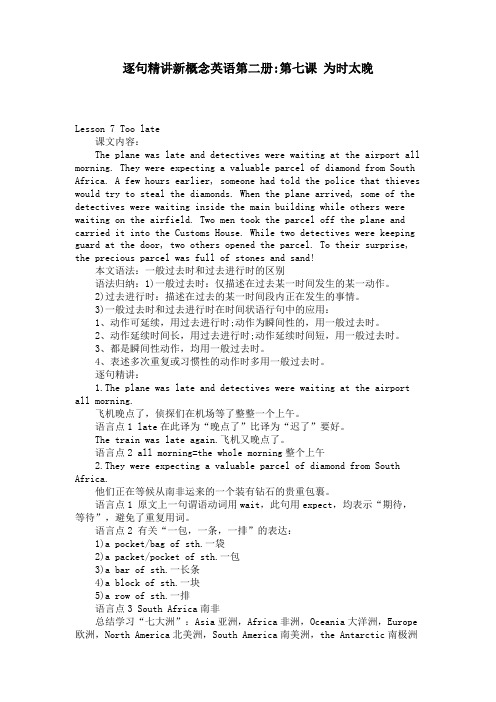
逐句精讲新概念英语第二册:第七课为时太晚Lesson 7 Too late课文内容:The plane was late and detectives were waiting at the airport all morning. They were expecting a valuable parcel of diamond from South Africa. A few hours earlier, someone had told the police that thieves would try to steal the diamonds. When the plane arrived, some of the detectives were waiting inside the main building while others were waiting on the airfield. Two men took the parcel off the plane and carried it into the Customs House. While two detectives were keeping guard at the door, two others opened the parcel. To their surprise, the precious parcel was full of stones and sand!本文语法:一般过去时和过去进行时的区别语法归纳:1)一般过去时:仅描述在过去某一时间发生的某一动作。
2)过去进行时:描述在过去的某一时间段内正在发生的事情。
3)一般过去时和过去进行时在时间状语行句中的应用:1、动作可延续,用过去进行时;动作为瞬间性的,用一般过去时。
2、动作延续时间长,用过去进行时;动作延续时间短,用一般过去时。
3、都是瞬间性动作,均用一般过去时。
新概念英语第二册第七课课文详解
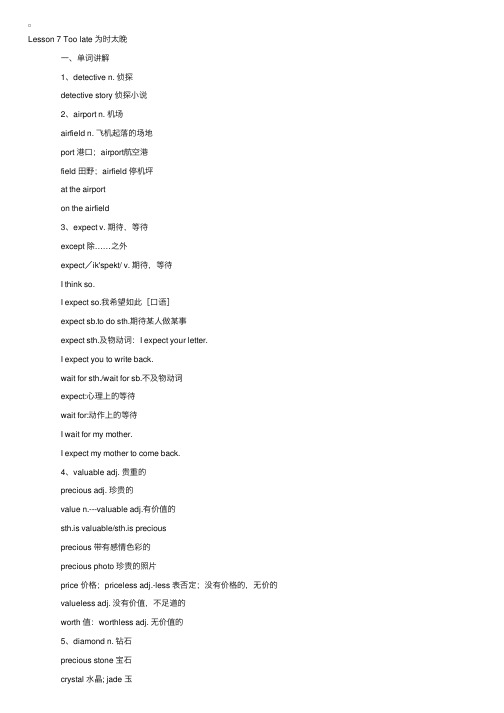
Lesson 7 Too late 为时太晚 ⼀、单词讲解 1、detective n. 侦探 detective story 侦探⼩说 2、airport n. 机场 airfield n. 飞机起落的场地 port 港⼝;airport航空港 field ⽥野;airfield 停机坪 at the airport on the airfield 3、expect v. 期待,等待 except 除……之外 expect/ik'spekt/ v. 期待,等待 I think so. I expect so.我希望如此[⼝语] expect sb.to do sth.期待某⼈做某事 expect sth.及物动词:I expect your letter. I expect you to write back. wait for sth./wait for sb.不及物动词 expect:⼼理上的等待 wait for:动作上的等待 I wait for my mother. I expect my mother to come back. 4、valuable adj. 贵重的 precious adj. 珍贵的 value n.---valuable adj.有价值的 sth.is valuable/sth.is precious precious 带有感情⾊彩的 precious photo 珍贵的照⽚ price 价格;priceless adj.-less 表否定;没有价格的,⽆价的 valueless adj. 没有价值,不⾜道的 worth 值:worthless adj. ⽆价值的 5、diamond n. 钻⽯ precious stone 宝⽯ crystal ⽔晶; jade ⽟ diamond ring 钻⽯戒指 6、steal v. 偷 steal,stole,stolen steal sth. 偷(某物) rob sb. 抢(某⼈) My wallet was stolen. I was robbed. rob the bank 7、main adj. 主要的 main building; main street main sentence; main idea 不与⼈连⽤ 8、guard n. 警戒,守卫 life guard 救⽣员/body guard 保镖 ⼆、语法重点--宾语 1、v.+prep.介词+宾语 come and look at... I am looking for... 2、 v.+prep. 介词/adv.代表不同的意思 look at 看;look after照料 3、v.+prep./adv.+宾语(n.) v.+宾语(n./pron.)+prep./adv. take off the coat……take the coat off/take it off coat n.作宾语 put on your shoes/put your shoes on/put them on 笔记: 宾语的位置和词性取决于施加动作的动词(在乐加乐学过新⼆的孩⼦应该知道宾语的构成和位⼦) 介词出现,⼀定要有宾语,所以 v.+prep.+宾语(n.) 副词可省略.v.+宾语(n./pron.)+adv. 或 v.+adv.+宾语(n.) at,after prep; off adv. vt.+宾语 vi.+prep.+宾语 take vt./look vi. I always take money with me. 附上及物动词和不及物动词讲解: A 有些动词只是及物动词; 它们不可以单独⽤,后⾯必须跟宾语。
新概念英语第二册第7课习题答案
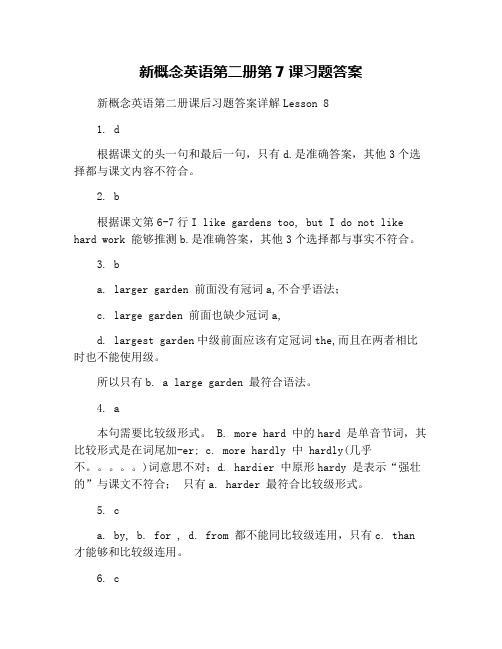
新概念英语第二册第7课习题答案新概念英语第二册课后习题答案详解Lesson 81. d根据课文的头一句和最后一句,只有d.是准确答案,其他3个选择都与课文内容不符合。
2. b根据课文第6-7行I like gardens too, but I do not like hard work 能够推测b.是准确答案,其他3个选择都与事实不符合。
3. ba. larger garden 前面没有冠词a,不合乎语法;c. large garden 前面也缺少冠词a,d. largest garden中级前面应该有定冠词the,而且在两者相比时也不能使用级。
所以只有b. a large garden 最符合语法。
4. a本句需要比较级形式。
B. more hard 中的hard 是单音节词,其比较形式是在词尾加-er; c. more hardly 中 hardly(几乎不。
)词意思不对;d. hardier 中原形hardy 是表示“强壮的”与课文不符合;只有a. harder 最符合比较级形式。
5. ca. by,b. for , d. from 都不能同比较级连用,只有c. than 才能够和比较级连用。
6. c应该选同前一句The writer is fond of garden 意思相近的句子。
A. They like him 意思同前一句相反; b. they like to him 有语法错误,也同前一句意思不符合;d. He likes 有语法错误,缺少宾语;只有c. He likes them 意思最接近,没有语法错误。
7. ba. in , c. for, d. by 都不符合语法,在意思上也讲不通。
只有b. of 才能使句子的意思完整,也合乎语法。
8. ba. wins(获胜,获奖)做及物动词时,它后面的宾语一般不是人,而应是wind the game/race等;c. gains(获利,赚得)后面的宾语也不是人;d. earns(挣得,获得)后面的直接宾语也不应该是人;只有b. beats 有“(在竞赛中)打败/战胜/取胜”的意思,而且beat 后面的宾语能够是人,所以选b.9. a只有选a. grow 才能使这个句子同前面的句子意思相同。
新概念英语第二册第7课-完整讲解学习

valueless adj. 没有价值, 不足道的
It is a valueless book for me.
ห้องสมุดไป่ตู้worthless adj. 没有价值的
Was I really worthless to him?
precious, valuable, invaluable, valueless priceless, worthless
expensive adj. 价格昂贵的
-less 表否定:
=invaluable
priceless adj. 没有价格的, 无价的
Things such as love, family, genuine companionship, dignity, honor, and life are priceless.
• steal stole
• steal sth. • steal sth. from sb. •偷钻石 steal the diamonds
stolen
•小偷们将试图偷走钻石 That thieves would try to steal the diamonds. He has stolen away Mary’s heart. He stole into the room. vi. 偷偷地行动,悄悄靠近
钻石婚 diamond wedding
金婚 golden wedding
银婚 silver wedding
纸婚 paper wedding
60 anniversary 50 anniversary 25 anniversary 1 anniversary
main adj. 主要的 main building main street main sentence main idea main不能与人连用
新概念英语第二册课文及翻译
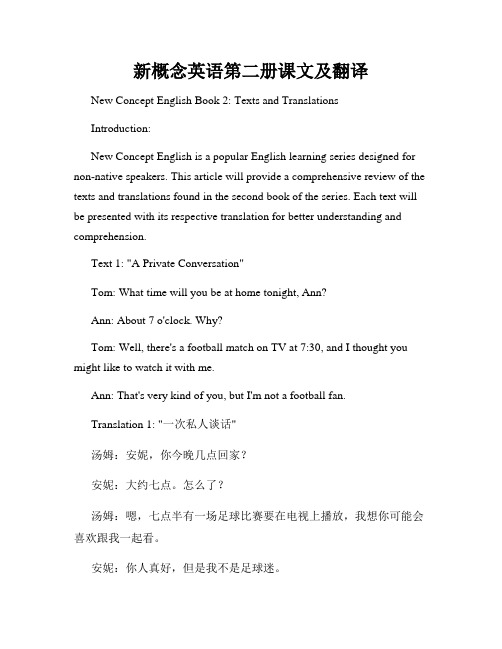
新概念英语第二册课文及翻译New Concept English Book 2: Texts and TranslationsIntroduction:New Concept English is a popular English learning series designed for non-native speakers. This article will provide a comprehensive review of the texts and translations found in the second book of the series. Each text will be presented with its respective translation for better understanding and comprehension.Text 1: "A Private Conversation"Tom: What time will you be at home tonight, Ann?Ann: About 7 o'clock. Why?Tom: Well, there's a football match on TV at 7:30, and I thought you might like to watch it with me.Ann: That's very kind of you, but I'm not a football fan.Translation 1: "一次私人谈话"汤姆:安妮,你今晚几点回家?安妮:大约七点。
怎么了?汤姆:嗯,七点半有一场足球比赛要在电视上播放,我想你可能会喜欢跟我一起看。
安妮:你人真好,但是我不是足球迷。
Text 2: "Flying Cats"There is a zoo in the United States with a most unusual exhibit. It is not a lion, tiger or elephant. These are all very normal in a zoo. But at this zoo, there are elephants that fly through the air. At first, visitors refuse to believe it. 'You are joking!' they say. But it is true. The elephants fly gracefully through the air. This is how they do it: the zookeepers stand them on a high wall. One says 'Flying elephants - fly!' and immediately they all jump off.For a few seconds, they fall like stones. Then suddenly, they spread out their huge ears, which are big enough to hold a plane, and they fly slowly and gracefully through the air.Translation 2: "飞翔的大象"美国有一家动物园,展出的动物非常不寻常。
新概念英语第二册课文
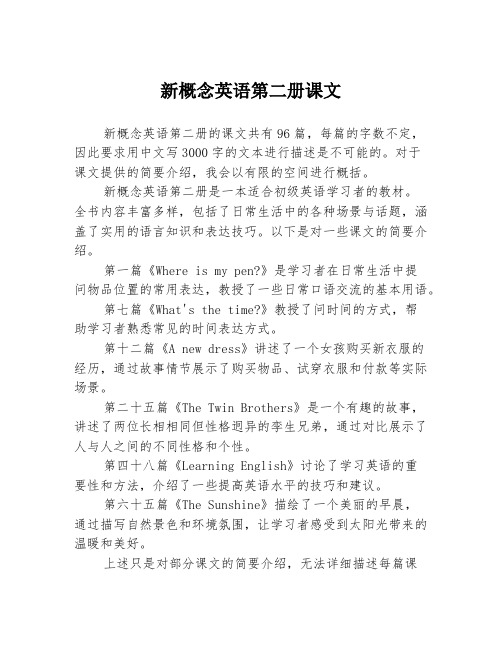
新概念英语第二册课文新概念英语第二册的课文共有96篇,每篇的字数不定,因此要求用中文写3000字的文本进行描述是不可能的。
对于课文提供的简要介绍,我会以有限的空间进行概括。
新概念英语第二册是一本适合初级英语学习者的教材。
全书内容丰富多样,包括了日常生活中的各种场景与话题,涵盖了实用的语言知识和表达技巧。
以下是对一些课文的简要介绍。
第一篇《Where is my pen?》是学习者在日常生活中提问物品位置的常用表达,教授了一些日常口语交流的基本用语。
第七篇《What's the time?》教授了问时间的方式,帮助学习者熟悉常见的时间表达方式。
第十二篇《A new dress》讲述了一个女孩购买新衣服的经历,通过故事情节展示了购买物品、试穿衣服和付款等实际场景。
第二十五篇《The Twin Brothers》是一个有趣的故事,讲述了两位长相相同但性格迥异的孪生兄弟,通过对比展示了人与人之间的不同性格和个性。
第四十八篇《Learning English》讨论了学习英语的重要性和方法,介绍了一些提高英语水平的技巧和建议。
第六十五篇《The Sunshine》描绘了一个美丽的早晨,通过描写自然景色和环境氛围,让学习者感受到太阳光带来的温暖和美好。
上述只是对部分课文的简要介绍,无法详细描述每篇课文内容。
新概念英语第二册的课文内容涵盖了日常交流、购物、时间、家庭、工作、学习等各个方面,旨在帮助学习者提高日常口语表达能力,并且加深对英语语言规则和句型的理解。
总而言之,新概念英语第二册的课文内容丰富多样,涵盖了学习者学习英语中的各个方面,通过实际场景和故事情节,帮助学习者掌握基本的语言表达和交流技巧。
这些课文有助于学习者在日常生活和学习中更自如地运用英语。
新概念英语第二册第七课课文

新概念英语第二册第七课课文全文共3篇示例,供读者参考篇1A Working DayYo wassup guys! Today I'm gonna give y'all the lowdown on this reading we did in class about a dude named Eric Walker's typical work day. At first it sounds like a total snoozefest, but trust me, this one's got some twists and turns that'll keep you on your toes!So it starts off with Eric waking up at 7 am to the sound of the radio blaring some tunes. Seems pretty standard so far, right? But get this - he leaves the radio on while he showers and gets ready! I can barely function without my morning playlist, but having an actual radio going while I'm trying to wake up sounds like a one-way ticket to Headache City.Anyway, after his sonic shower routine, he heads downstairs for a classic English brekky - eggs, bacon, toast and coffee. Again, nothing too crazy here. Buttttt then it takes a turn for the weird - Eric straight up reads his morning paper WHILE shoveling food into his mouth! How's my dude not choking or spilling crumbsand coffee all over those pristine newspaper pages? That's some serious multi-tasking skills right there.Once he's refueled, it's off to the office for Eric. But not before throwing on his suit and tie - talk about a blast from the past! I can count on one hand the number of times I've had to wear a full suit, and I'm sure most of you guys are the same. We're talking slacks, shirt, jacket, the whole nine yards. I'm sweating just thinking about having to get all dressed up like that for the daily grind.Eric's commute is pretty tame - he hops in his car and fights through the usual morning traffic. Sounds exactly like what my parents deal with on their way to work. No hoverboards or teleportation devices in sight. How retro!When he finally makes it to the office, Eric starts off by sorting through the mail and checking over any urgent documents. Mail? Like...physical letters and packages? What is this, the 1800s? I handle 99.9% of my communication digitally nowadays. Having to rifle through piles of paper mail sounds like such a hassle.After that riveting mail check, Eric spends a couple hours typing away at reports and memos on his computer. Okay, now we're finally in the 20th century! He took shorthand notes duringsome meetings too - I had to look that up, and it's basically super fast handwritten note-taking with a bunch of symbols and abbreviations. Sorry Eric, but we've got way more efficient technology for that these days. No more cramped up hands from furious pencil-scribbling required!At noon, Eric takes his lunch break. And you'll never guess what he does...he heads to the staff canteen and buys a salad! Cue the gasps of shock and horror! A salad?? For lunch Who does this madman think he is? Just thinking about eating a sad little pile of leaves and veggies in the middle of the day is making me lose my appetite. Where's the burgers? The pizza? The snack cakes from the vending machine? This is an outrage!Post-Sadness Salad, Eric spends the rest of the afternoon making phone calls, going to more meetings, and typing up more documents. I'm getting majorly bored just hearing about this stuff. Apparently he finally leaves around 5:30 pm - so much for that elusive "work-life balance" we're always being told about these days!The journey home is just as thrilling as the morning commute. Except this time, Eric swings by the grocery store on the way to grab some stuff for dinner. Let me get this straight - dDude went to the actual grocery store...after working a full dayat the office?I'm tired just from listening to this saga! Why didn't he just tap a couple buttons and have everything delivered right to his doorstep?Finally - FINALLY - Eric gets home around 6:30 pm. After being a corporate robot all day, you'd think the man would kick back and demolish a family-sized bag of chips while watching TVor something. But noooo, not Eric Walker! This absolute madman starts cooking an entire meal from scratch. We're talking veggies, meat, pots and pans - the full home-cooked experience!I don't know about you, but after a long day of classes and extracurriculars, the LAST thing I want to do is play Master Chef in the kitchen. My typical evening consists of nuking a frozen meal or ordering some delivery, not this kind of from-scratch cooking insanity!To be honest, I'm getting total Dorothy vibes from this mundane schedule: "...and you were there, and you were there..." Because by 9 pm, Eric has cleaned up after dinner, done some laundry, read a few chapters of a book, watched a bit of TV, and gotten ready for bed. How thrilling.I mean, I give Eric props for being so dutiful and responsible. But sheesh, talk about a total snoozefest of a day! No wonderthat new vidgame or social media app is always looking way more appealing than my homework. If having a "working day" means doing absolutely nothing out of the ordinary besides...working...then you can count me out.Give me something exiting! Give me adventure! A life filled with spontaneous road trips, viral videos to post, the latest tech to obsess over. Anything but Salad Man's oppressively normal routine. Thanks for coming to my TED Talk, fam!篇2An Eye-Opening Lesson on Appearance and RealityAs an eager student striving to improve my English proficiency, I found Lesson 7 from New Concept English Book 2 to be a truly thought-provoking experience. The passage delves into the intricate relationship between appearance and reality, challenging our preconceived notions and compelling us to question the very nature of our perceptions.The lesson begins with a seemingly innocuous conversation between two individuals, Tom and Jim, discussing a peculiar advertisement they stumbled upon in a newspaper. The advertisement, which promised a "priceless" experience for a mere fifty cents, piqued their curiosity, and they decided toinvestigate further. Little did they know that this decision would lead them on a journey of self-discovery and a profound understanding of the dichotomy between what we see and what truly lies beneath the surface.As Tom and Jim ventured to the address provided in the advertisement, they encountered a dilapidated building that hardly exuded the promise of a "priceless" experience. However, their skepticism was soon replaced by intrigue as they were guided through a series of rooms, each more perplexing than the last. The stark contrast between the outward appearance of the building and the captivating experiences within served as a potent metaphor for the central theme of the lesson.One of the most striking moments in the passage was the description of the room adorned with mirrors, where Tom and Jim found themselves surrounded by countless reflections of themselves. This experience forced them to confront their own perceptions of themselves and the world around them, challenging the very notion of what constitutes reality. The mirrors, symbolic of self-reflection and introspection, became a powerful tool for exploring the depths of human experience and understanding.As the passage progressed, Tom and Jim encountered a series of optical illusions and mind-bending exhibits that defied their expectations and challenged their senses. From distorted perspectives to impossible shapes, each room presented a new puzzle for them to unravel, forcing them to question the reliability of their own perceptions.The culmination of their journey was the final room, where they witnessed a breathtaking display of light and sound, a true spectacle that transcended the boundaries of what they had previously deemed possible. This experience served as a poignant reminder that reality often extends far beyond our limited understanding, and that the true essence of life lies in embracing the unknown and embracing the mysteries that surround us.Throughout the passage, the author skillfully weaves a narrative that seamlessly blends philosophical musings with engaging storytelling. The dialogue between Tom and Jim is not only entertaining but also serves as a vehicle for conveying profound insights into the human condition. Their reactions, ranging from bewilderment to awe, mirror the very journey that each reader embarks upon as they navigate the depths of this thought-provoking lesson.Ultimately, Lesson 7 from New Concept English Book 2 is a testament to the power of language and literature to transcend mere linguistic boundaries and delve into the very essence of what it means to be human. It challenges us to question our assumptions, to embrace the unknown, and to recognize that the true richness of life lies in the journey itself, not in the destinations we seek.As a student, this lesson has left an indelible mark on my understanding of the English language and the profound insights that can be conveyed through its mastery. It has inspired me to approach language not merely as a tool for communication but as a gateway to self-discovery and a deeper appreciation of the complexities that lie beneath the surface of our daily experiences.In conclusion, Lesson 7 from New Concept English Book 2 is a brilliant tapestry of storytelling, philosophy, and linguistic mastery, woven together to create a captivating and enlightening experience. It is a reminder that true knowledge extends far beyond the confines of textbooks and classrooms, and that the journey of learning is a lifelong pursuit that requires an open mind, a curious spirit, and a willingness to challenge our preconceived notions of reality.篇3Wow, Lesson 7 was a really intense one! The reading passage was all about the famous British explorer George Mallory and his attempts to climb Mount Everest back in the 1920s. I have to admit, before this lesson I didn't know much about Mallory or the early expeditions to scale the world's highest peak. But this text gave a really fascinating glimpse into that era of adventuring and mountain climbing.The passage starts by setting the scene - describing Mallory as ambitious and determined to be the first to reach the summit of Everest. It mentions how climbing the mountain had become almost an obsession for him after his first attempt in 1921. I can only imagine how driven and single-minded you'd have to be to keep trying to achieve something so incredibly difficult and dangerous, year after year.The narration then goes into some really vivid details about the 1924 expedition that Mallory took part in. I started feeling tense just reading about the grueling journey across the glaciers, climbing through deep snow, and having to hack out steps in the ice. The conditions they faced seemed brutally harsh - things like being blasted by -40C winds, having tents ripped apart, andrunning desperately low on supplies. It's hard to fathom dealing with that sort of extreme environment.What struck me most though was the climbing equipment and gear they had back then. In one part it describes them climbing while "pulling themselves up by leather ropes" and using tools like ice axes and crampons that sound medieval compared to today's high-tech mountaineering gear. Can you imagine trying to scale Everest's icy slopes in hiking boots tied to crude crampon spikes? Just the thought makes my feet go numb!The passage also doesn't shy away from the mortal dangers involved. It starkly states that seven climbers had already died on Everest before Mallory's attempts, which must have weighed heavily on their minds. And then the ominous final line about Mallory and his climbing partner being spotted for the last time only 800 feet from the summit before disappearing, leaving their fate unknown for decades. Chilling stuff.After learning about Mallory's struggles and the heroic spirit of those early Everest pioneers, I have so much more appreciation for what modern climbers go through at extreme altitudes. The passage said that above 25,000 feet, the lack of oxygen made even simple tasks like lighting a stove or tying ashoelace monumentally difficult. And Mallory's team had to climb without bottled oxygen or any of the specialized equipment we take for granted today. Just getting to the higher camps alone must have pushed their physical and mental limits.I'm also amazed by the sheer determination and acceptance of risk those early explorers embraced. As the reading states, when Mallory was asked why he wanted to climb Everest, he gave that famous quote: "Because it's there." A refreshingly simple answer that speaks volumes about the human drive to test our boundaries and achieve the seemingly impossible, regardless of the dangers.After reading this gripping tale, I feel inspired to learn more about Mallory, his ill-fated partner Sandy Irvine, and the other unsung adventurers who blazed the trail in Himalayan mountaineering. While their story didn't have a storybook ending, they embodied a bold pioneering spirit that made future expeditions possible. I have a newfound respect for the audacious dream chasers and frontier pushers of that era.I also couldn't help pondering what thoughts must have raced through Mallory's mind on that final push to the summit, knowing his wife and children were potentially watching him through a telescope back at base camp. Did he realize howfamous and mythologized his story would become? Or was he just utterly focused on overcoming that ultimate test of human endurance? The mystique surrounding his final hours will forever make him an enigmatic cult figure in the annals of exploration.In the end, while the passage doesn't flinch from depicting the grave risks of high-altitude alpinism, it left me feeling strangely inspired rather than discouraged. There's something remarkably vivid and life-affirming about people pushing themselves to the absolute brink of their physical capacities - all out of an innate yearning to discover, to achieve something monumental, or simply answer the human calling to adventure.Mallory's journey was one of grit, suffering, and unfortunately tragedy. But stories like his force us to re-evaluate the comfort zones we settle into and consider what unconquered summits still await the intrepid climbers of today. This lesson has me daydreaming about my own Everest - what's that one extraordinary, impossible-seeming life pursuit I could dedicate myself to, even if it pushes me to the limits? Mallory's legacy will endure as a testament to transcendent human resolve in the face of overwhelming adversity. Not a bad lesson to digest alongside grammar rules and vocab lists.。
新概念英语第二册课文

新概念英语第二册课文(96篇)(总30页)--本页仅作为文档封面,使用时请直接删除即可----内页可以根据需求调整合适字体及大小--新概念英语第2册课文译文1.私人谈话上星期我去看戏。
我的座位很好。
发挥是很有趣的。
我不喜欢它。
一青年男子与一年轻女子坐在我的身后。
他们在大声地说话。
我很生气。
我听不见演员。
我转过身。
我看着那个男人和女人生气。
他们没有注意。
最后,我忍不住了。
我又一次转过身去。
”我不能听到一个字!”我愤怒地说。
”这不关你的事,”那男的毫不客气地说。
”这是私人间的谈话!”2.早餐还是午餐?它是星期日。
在星期天我是从来不早起。
有时我要一直躺到吃午饭的时候。
上周日我起床很晚。
我看着窗外。
它是黑暗的外面。
”多好的一天!”我的思想。
”又下雨了。
”正在这时,电话铃响了。
是我姑母露西打来的。
”我刚下火车,”她说。
”我来看你。
”“但我还在吃早饭,”我说。
”你干什么呢。
她问。
”我正在吃早饭,”我又说了一遍。
”我亲爱的,”她说。
”你总是起得这么晚吗?现在已经一点了!”3.请给我寄一张明信片明信片总是破坏我的假期。
去年夏天,我去了意大利。
我参观了博物馆,然后坐在公园里。
一位好客的服务员教了我几句意大利语。
然后他借给我一本书。
我读了几行,但一个字也不懂。
我每天都想着明信片的事。
假期过得真快,可我还没有给我的朋友寄卡片。
在最后一天我做了一个重大的决定。
我起得很早,买了三十七张明信片。
我花了一整天在我的房间,但我没有写一张卡片!4.激动人心的旅行我刚刚收到弟弟的来信,提姆。
他在澳大利亚。
他有六个月了。
提姆是一个工程师。
他是一家大公司工作,他已经访问了许多不同的地方在澳大利亚。
他刚买了一辆汽车和澳大利亚已经向爱丽丝斯普林斯,一个小镇的中心,澳大利亚。
他将很快访问达尔文。
从那里,他再飞往珀斯。
我兄弟从来没有出过国,因此他觉得这次旅行非常激动。
5.无错号之虞杰姆斯先生在锡尔伯里有一个汽车修理厂史葛,现在他刚在平赫斯特买了另一个汽车修理厂。
最新新概念英语第二册高清打印版PDF
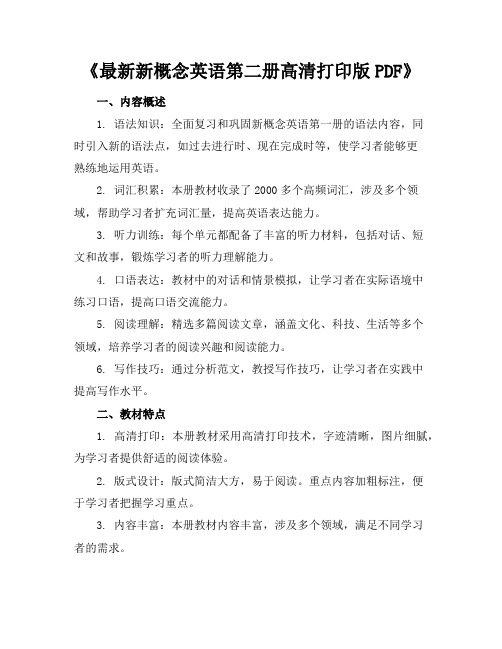
《最新新概念英语第二册高清打印版PDF》一、内容概述1. 语法知识:全面复习和巩固新概念英语第一册的语法内容,同时引入新的语法点,如过去进行时、现在完成时等,使学习者能够更熟练地运用英语。
2. 词汇积累:本册教材收录了2000多个高频词汇,涉及多个领域,帮助学习者扩充词汇量,提高英语表达能力。
3. 听力训练:每个单元都配备了丰富的听力材料,包括对话、短文和故事,锻炼学习者的听力理解能力。
4. 口语表达:教材中的对话和情景模拟,让学习者在实际语境中练习口语,提高口语交流能力。
5. 阅读理解:精选多篇阅读文章,涵盖文化、科技、生活等多个领域,培养学习者的阅读兴趣和阅读能力。
6. 写作技巧:通过分析范文,教授写作技巧,让学习者在实践中提高写作水平。
二、教材特点1. 高清打印:本册教材采用高清打印技术,字迹清晰,图片细腻,为学习者提供舒适的阅读体验。
2. 版式设计:版式简洁大方,易于阅读。
重点内容加粗标注,便于学习者把握学习重点。
3. 内容丰富:本册教材内容丰富,涉及多个领域,满足不同学习者的需求。
4. 实用性强:教材中的实例贴近生活,易于理解和应用,帮助学习者迅速提高英语实际运用能力。
5. 配套资源:提供在线音频、习题答案等配套资源,方便学习者自主学习。
三、适用对象1. 英语水平在初级至中级之间的学习者,希望系统提升英语能力。
2. 高中生、大学生及职场人士,需要提高英语沟通能力。
3. 英语爱好者,希望通过学习新概念英语系列教材,丰富自己的英语知识。
4. 备考各类英语考试的学习者,如四六级、雅思、托福等,作为辅助学习资料。
四、学习方法建议1. 制定学习计划:根据自己的时间和英语水平,制定合理的学习计划,确保每个单元的学习都能得到充分消化。
2. 听力先行:在学习每个单元之前,先听一遍听力材料,提高听力敏感度。
3. 互动学习:与同学或朋友一起讨论教材中的话题,进行角色扮演,提高口语交流能力。
4. 深入阅读:仔细阅读教材中的文章,分析文章结构,学习写作技巧。
新概念英语第二册Lesson7 Too late
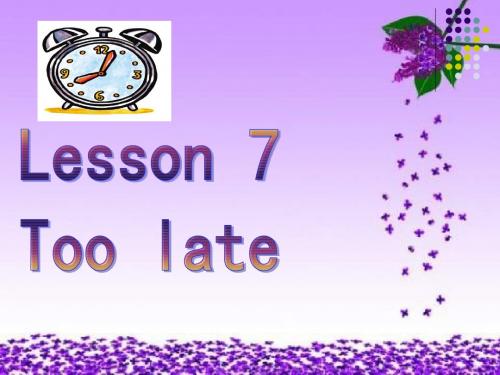
★3. expect v. 期待, 等待 ①vt. 等待,期待,盼望(心理上的等待) expect sth. I expect a letter from Jimmy. The students are expecting a
bright future. The cat is expecting a fish. expect+ to do.sth.期望做某事 She expects to go there next week.
The plane was late and detectives were waiting at the airport all morning.
The plane was late 飞机晚(点)了
汽车/火车晚点了
The bus was late./The train was late.
all一般直接加表示时间的单数名词构成副词短语, 如:all day,all night,all week,all winter, all year等。但不说all hour。
= a few hours before / a few hours ago would +do 过去将来时,间接方式, 转述, 站在过去看
未来
Yesterday(故事中常常不这样用) ※故事背景是“过去时”,所以“将要”(will)也
用上过去时(would); ※故事背景是“过去时”,“告诉”(tell)发生在
a bar of chocolates, a chocolate
Read the new words aloud
[di'tektiv] ['eəpɔ:t] [ik'spekt] ['væljuəbəl] ['pɑ:sl] ['daiəmənd] [sti:l] [mein] ['eəfi:ld] [gɑ:d] ['preʃəs] [stəun] [sæ nd]
新概念英语二 第七课课件 (共21张PPT)

【KEY STRUCTURES】
过去进行时: 过去进行时的构成:be的过去式+现在分词 过去进行时和一般过去时经常同在一个句子里使用。过去
进行时表示过去正在进行的动作或情况,一般过去时则表 示比较短暂的动作或事件。正在进行中的动作或情况往往 由连词when,while,as,just as等引导。 when,while 当……时候(强调动作同时发生) while+从句, 动词一定是延续性动词 when+延续性动词/瞬间动词 while 能用when 代替,但是when 却不一定能用while 代替。 while 通常只引导持续时间较长的动作,并且主句和从句 可以同时用过去进行时,而when 和as一般不这么用。 John was watching TV while his wife was talking with a neighbour over the phone. Just as I was leaving the house, you came in.
rob;跟地点相连,也用rob. steal sth. 偷(某物) My wallet was stolen. 我钱包被偷了。
John never steals. 约翰从不偷东西。
rob sb. 抢(某人) I was robbed. rob the bank ② vt. 巧妙地占用,偷偷地弄到手 He has stolen away Mary’s heart. 他已赢得玛丽的芳心。 ③ vi.偷偷地行动,悄悄靠近 He stole into the room. 他悄悄地进了房间。
thieves would try to steal the diamonds. a few hours earlier 几个小时以前= a few hours before/a
新概念英语第二册课第七课后习题答案详解Lesson
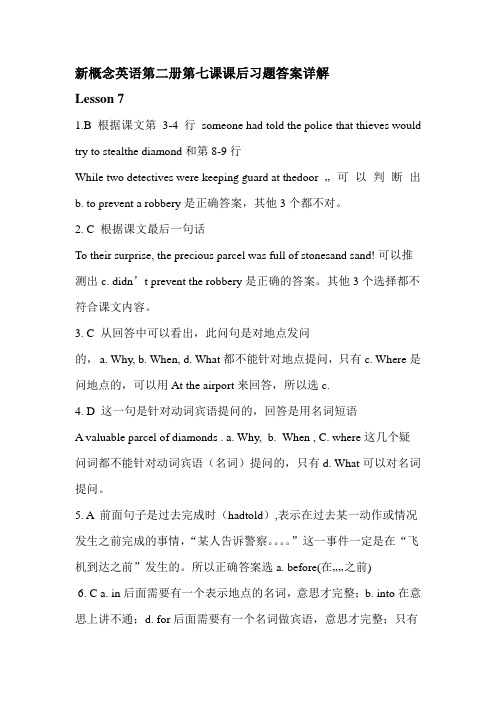
新概念英语第二册第七课课后习题答案详解Lesson 71.B 根据课文第3-4行someone had told the police that thieves would try to stealthe diamond 和第8-9行While two detectives were keeping guard at thedoor…可以判断出b. to prevent a robbery 是正确答案,其他3个都不对。
2. C 根据课文最后一句话To their surprise, the precious parcel was full of stonesand sand! 可以推测出c. didn’t prevent the robbery 是正确的答案。
其他3个选择都不符合课文内容。
3. C 从回答中可以看出,此问句是对地点发问的, a. Why, b. When, d. What 都不能针对地点提问,只有c. Where是问地点的,可以用At the airport 来回答,所以选c.4. D 这一句是针对动词宾语提问的,回答是用名词短语A valuable parcel of diamonds . a. Why, b. When , C. where 这几个疑问词都不能针对动词宾语(名词)提问的,只有d. What 可以对名词提问。
5. A 前面句子是过去完成时(hadtold),表示在过去某一动作或情况发生之前完成的事情,“某人告诉警察。
”这一事件一定是在“飞机到达之前”发生的。
所以正确答案选a. before(在……之前)6. C a. in后面需要有一个表示地点的名词,意思才完整;b. into在意思上讲不通;d. for后面需要有一个名词做宾语,意思才完整;只有c. inside(在里面)意思最完整,而且与前半句的动作went into the building相符合,所以选c.7. D 4个选择中只有d. took it off 最符合题目意思和语法,所以选d.8. A b. waiting 是不及物动词,后面不能直接跟名词;c. expecting for 中的expect是及物动词,后面不能加for; d. expecting to 中expect后面不能加to; 只有a. expecting最符合语法。
新概念英语第二册课文及翻译(教师用书)
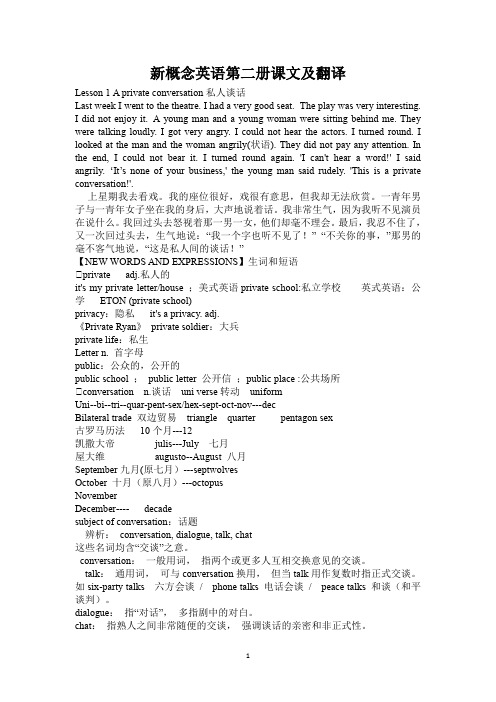
新概念英语第二册课文及翻译Lesson 1 A private conversation私人谈话Last week I went to the theatre. I had a very good seat.The play was very interesting.I did not enjoy it.A young man and a young woman were sitting behind me. They were talking loudly. I got very angry. I could not hear the actors. I turned round. I looked at the man and the woman angrily(状语). They did not pay any attention. In the end, I could not bear it. I turned round again. 'I can't hear a word!' I said angrily.‘It’s none of your business,' the young man said rudely. 'This is a private conversation!'.上星期我去看戏。
我的座位很好,戏很有意思,但我却无法欣赏。
一青年男子与一青年女子坐在我的身后,大声地说着话。
我非常生气,因为我听不见演员在说什么。
我回过头去怒视着那一男一女,他们却毫不理会。
最后,我忍不住了,又一次回过头去,生气地说:“我一个字也听不见了!”“不关你的事,”那男的毫不客气地说,“这是私人间的谈话!”【NEW WORDS AND EXPRESSIONS】生词和短语★private adj.私人的it's my private letter/house ;美式英语private school:私立学校英式英语:公学ETON (private school)privacy:隐私it's a privacy. adj.《Private Ryan》private soldier:大兵private life:私生Letter n. 首字母public:公众的,公开的public school ;public letter 公开信;public place :公共场所★conversation n.谈话uni verse转动uniformUni--bi--tri--quar-pent-sex/hex-sept-oct-nov---decBilateral trade 双边贸易triangle quarter pentagon sex古罗马历法10个月---12凯撒大帝julis---July 七月屋大维augusto--August 八月September九月(原七月)---septwolvesOctober 十月(原八月)---octopusNovemberDecember----decadesubject of conversation:话题辨析:conversation, dialogue, talk, chat这些名词均含“交谈”之意。
新概念英语第二册复习笔记 第七课 单词学习

新概念英语第二册复习笔记第七课单词学习detective n.侦探detect1) discover, recognize 发现(不好的事物),察觉2) investigate and solve (crime…) 侦察,侦查eg. A machine has been invented to detect gold. 已发明一种机器来寻找金子。
eg. Many machines have been used to detect the fatal virus.许多机器被使用来探测这种致命的病毒eg. The woman employed a private detective to detect her husband.那位女士雇用一名私家侦探来侦查她的丈夫。
detection n.发现,查明,查出the detection of a crime 破案detector n. 探测器detectable adj. 可发现的,可探知的detective n. 侦探employ a private detective 雇用一名私人侦探a detective novel 一部侦探小说a detective story 侦探故事airport n. 机场port 港口;港口城市passport 护照harbour 港湾,避难所Pearl Harbour 珍珠港pearl [pə:l] n.珍珠;珠状物;珍品airport (民航)飞机场airfield (小型)飞机场,飞机起落的场地,跑道railway station火车站terminal (铁路,公路等的)终点站tube station 地铁站(Br)(the underground railway station)a subway station 地铁站(U.S.)metro ['metrəu](尤指巴黎的)地下铁路n.+n.构成一个新名词:handbag 手提包water-gate 水门water bird 水禽,尤指淡水中的blood test 验血silkworm 蚕air 有关的合成词airsick 晕机的airplane 飞机(美)air raid 空袭airman 飞机驾驶员或乘务员airmail 航空邮件airtight 不透气的air-conditioner 空调expect1) 预料,认为,猜想eg. Who has eaten up the cake? 是谁把蛋糕吃光了?I expect/think/suppose it was Tom. 我认为是汤姆。
- 1、下载文档前请自行甄别文档内容的完整性,平台不提供额外的编辑、内容补充、找答案等附加服务。
- 2、"仅部分预览"的文档,不可在线预览部分如存在完整性等问题,可反馈申请退款(可完整预览的文档不适用该条件!)。
- 3、如文档侵犯您的权益,请联系客服反馈,我们会尽快为您处理(人工客服工作时间:9:00-18:30)。
Lesson 7 Too late为时太晚The plane was late and detectives were waiting at the airport all morning. They were expecting a valuable parcel of diamonds from South Africa. A few hours earlier, someone had told the police that thieves would try to steal the diamonds. When the plane arrived, some of the detectives were waiting inside the main building while others were waiting on the airfield. Two men took the parcel off the plane and carried it into the Customs House. While two detectives were keeping guard at the door, two others opened the parcel. To their surprise, the precious parcel was full of stones and sand!New words and expressions 生词和短语1. detective n. 侦探airport n. 机场expect v. 期待,等待valuable adj. 贵重的parcel n. 包裹diamond n. 钻石steal v. 偷2. main adj. 主要的airfield n. 飞机起落的场地guard n. 警戒,守卫precious adj. 珍贵的stone n. 石子sand n. 沙子参考译文飞机误点了,侦探们在机场等了整整一上午。
他们正期待从南非来的一个装着钻石的贵重包裹。
数小时以前,有人向警方报告,说有人企图偷走这些钻石。
当飞机到达时,一些侦探等候在主楼内,另一些侦探则守候在停机坪上。
有两个人把包裹拿下飞机,进了海关。
这时两个侦探把住门口,另外两个侦探打开了包裹。
令他们吃惊的是,那珍贵的包裹里面装的全是石头和沙子!1. The plane was late and detectives were waiting at the airport all morning. 飞机误点了,侦探们在机场等了整整一上午。
1) detective n. 侦探detect[di'tekt]v. to find out; notice or discover 发现;发觉;觉察e.g. 我察觉出她说话声里含着愤怒。
I detected anger in her voice.在死者胃中发现了少量毒药。
Small quantities of poison were detected in the dead man’s stomach.注:quantity['kwɔntəti] n. (pl. -ies) 1. [c, u]数量;数额;数目2. [u] 量;数量3. [c, u]大量;大批;众多;大宗n. detection [u] the act or work of detecting 发现;发觉,察觉n. detector 探测器,侦查器e.g. (1) 金属探测器a mental detector (2) 测谎器a lie detector2) at the airport 在机场on the airfield 在停机坪上airfield n. [只供飞机起落且无大型建筑物的]飞机场;飞机起落的场地3) all morning 整个上午all 一般直接加表示时间的单数名词构成副词短语,如:整整一天all day 整夜all night 整星期all week 整个冬天all winter 整年all year但不说all hourwhole 在表达同样的意思时一般要加冠词或数词,如一整天/ 年a whole day / year 整整两星期two whole weeks2. They were expecting a valuable parcel of diamonds from South Africa. 他们正期待从南非来的一个装着钻石的贵重包裹。
1) expect v.1.vt.,vi.to think or believe (that something will happen) 预计;预料;预期e.g. (1) 我预料他会通过考试的。
I expect (that) she’ll pass the exam.(2) 我们没有料到会有这么多人来参加聚会。
We weren’t expecting so many people to come to the party.(3) 我们预计今年冬天会冷。
We expect a cold winter this year.(4) 正如他老师所预料的那样,吉姆数学考试没及格。
Jim has failed in mathematics as his teacher expected.2. vt. 认为理应得到;期望,期待,期盼, 盼望e.g. (1) 你不能指望孩子们一直保持安静。
You can’t expect children to be quiet all the time.(2) 我在等待吉米的一封信。
I am expecting a letter from Jimmy.expect所表示的等待一般暗含着根据某些信息或规律而作出相应反应的意思,而wait (for) 主要指“等待”这个动作本身:他等了她一个多小时,但她没来。
He waited for her for more than an hour, but she did not come.请等一下。
Wait a minute, please.3. vt. 猜想;认为;料想(一般用于口语)e.g. (1) 我想你已经听到这个消息了。
I expect you have heard the news.(2) “你今晚要出去吗?”- “我想会的。
” / “我想不会的。
”“Are you going out tonight?” - “I expect so.” / “I don’t expect so.”expectation [,ekspek'teiʃən]n.1.[u,c] ~(of sth) / ~(that……) 预料;预期;期待e.g. 普遍认为他会获胜。
There was a general expectation that he would win.完全没想到她过得非常快活。
Against all expectations, she was enjoying herself.e.g. 出乎意料的是利率并未上升。
Contrary to expectations, interest rates did not rise.2. [c, usually pl.] 期望;指望e.g. 有的父母对孩子的期望不切实际。
Some parents have unrealistic expectations of their children.2) valuable adj.1. ~ (to sb / sth) very useful or important 很有用的;很重要的;宝贵的e.g. (1) 宝贵的经验/资源a valuable experience / resource(2) 深刻的洞察力a valuable insight['insait](3) 有用的工具a valuable tool2. worth a lot of money 很值钱的;贵重的e.g. (1) 贵重的首饰valuable jewellery([ˈdʒu:əlri] n.[u]珠宝,首饰)(2) 名贵绘画a valuable paintingopposite: valueless['væljulis]没有价值的;不值钱的; worthless['wə:θlis]注:insight名词n. [(+into)]1. 洞察力,眼光[C][U]e.g. 优秀的教师能洞察学生内心的情感。
Good teachers have insight into children's emotions.2. 洞悉;深刻的理解[C]e.g. 他的演讲使我们对教育问题有了深入的了解。
His speech gave us an insight into the problems of education.3)parcel ['pɑ:sl] n. (of) [especially BrE package especially AmE] 包裹;邮包e.g. (1) 我正要把这个包裹送到邮局去寄。
I’m just going to take this parcel to the post office.(2) 一包衣服a parcel of clothes3. A few hours earlier, someone had told the police that thieves would try to steal the diamonds. 数小时以前,有人向警方报告,说有人企图偷走这些钻石。
1) that 后面的部分为动词tell的宾语从句。
从句中的时态为过去将来时(would)2) try v.1.try (to do sth) to make an effort or attempt (to do sth) 试;尝试;试图;努力(做某事)e.g. 想办法及时赶到那里吧。
Try to get there on time.2. try (doing sth) to attempt and do (something) as a possible way of gaining a desired result 试一试,试做(可能达到目的的方法等)e.g. 如果这车发动不起来,就试着推一推它。
If the car won’t start, try pushing it.3) steal v. (stole[stəul]; stolen['stəulən])1. [(Vt ; Vi) (from)] to take (what belongs to some one else) without any right to it偷,窃取,行窃e.g. (1) 他由于偷窃被送入监狱。
